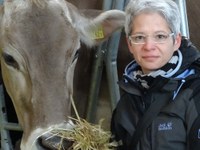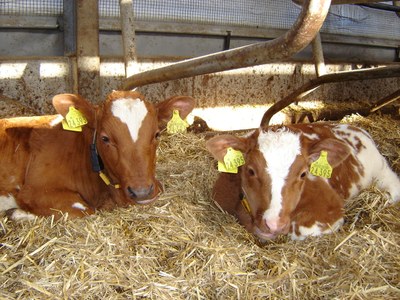
Branch
Applied Ethology and Animal Welfare
in charge: Prof. Dr. Edna Hillman
In our research, we focus on the effects of housing conditions and management on the welfare of farm animals. We need scientific knowledge for reliable welfare assessment, for policymaking and for meeting societal expectations.
Animal Welfare Science covers a broad range from validation of welfare indicators, including animal health, to practical implementation.

The behavioural repertoire of animals has evolved in a way that was adapted to the natural environment. In those circumstances, behaviour fulfils specific functions, e.g. feeding, mating, and fighting. Since farmers care for feed and reproduction in modern housing systems, some of these behaviours became unnecessary. Nevertheless, animals are still motivated to perform some of these behaviours. In addition, some management procedures may exceed the adaptability of the animal.
The gap between function, motivation and the possibilities to perform species-specific behaviours may exceed the animal´s coping capacity, which eventually can lead to behavioural disorders, physiological disruptions, illness and production losses.
• Welfare indicators

Welfare assessment is a central aspect of our research. We focus on thorough measurement of several indicators that we then validate.

For this aim, we use a combination of behavioural observations, either direct or via video recordings, and (stress-) physiological, clinical and cognitive parameters. The use of different sensor systems for measuring behaviour becomes more and more relevant.
• Effect of rearing conditions on animal welfare
Artificial rearing, i.e. separating the offspring from the dam shortly after birth has been found to affect animal health, learning abilities, stress resilience, and social behaviour in the young.

Furthermore, the consumer acceptance for artificial rearing, at least in mammals, is low. Dam rearing could increase animal welfare, but we need scientific knowledge about effects on welfare, practicability, and economic outcome. Artificial rearing concerns not only dairy cattle, but also dairy goats and sheep, and pigs. We want to continue to investigate artificial vs dam rearing in farm animals within our institute and together with colleagues in Germany, Switzerland, and other European countries. Moreover, we will include other aspects regarding rearing conditions such as free farrowing.
Current projects
► see: https://fis.hu-berlin.de/converis/portal/Person/900636529?lang=en_GB
Former projects
► Influence of calf–cow contact during rearing on social competence and stress reactivity in calves
► Behavioural and cardiac reactions to acoustic stimuli in ruminants
► Effect of milking stall dimensions on behavior and physiology of dairy cows during milking
